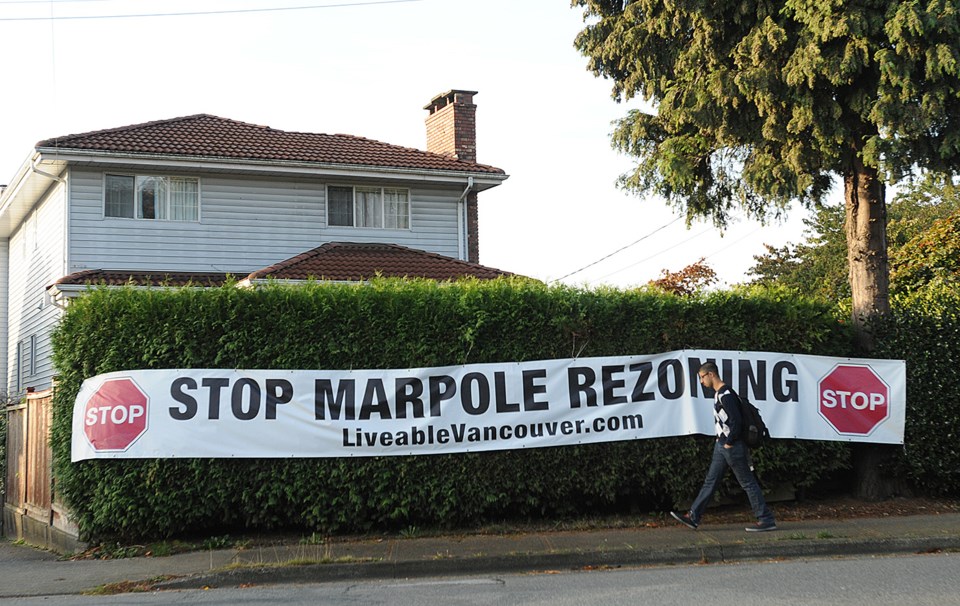Nearly 75 residents came to the Oakridge Community Centre in Marpole Nov. 6 to hear how the city might implement a different kind of development planning process.
The city is designing a new zoning plan for Marpole. Following controversy over proposals for increased density in the neighbourhood, the city extended consultations with residents to March. The last of three “Democracy and Development” townhall meetings, the event was organized by Green Party Coun. Adrienne Carr, following similar meetings in the West End and Grandview-Woodland earlier this month.
Two guest speakers addressed the meeting — former Vancouver city planner Peter Burch, and architecture professor Patrick Condon, chair of the Masters of Urban Design Program at UBC.
“Why is there so much pushback on these community plans?” said Burch. “I think it’s about transparency. It seems that many people were very surprised that the introduction of some land use changes were not part of the ongoing discussions. In theory, if those changes were well thought out and if the city was firm about them, they should have been introduced from the onset of the process.”
Burch added that overall, “there is a tension now between the art and science of city planning.” He added: “Only the community knows what is happening on the ground, so for planners to bring residents into the planning process is not a charity to them, but a necessity.”
Condon outlined key features of the increasingly popular “charrette” process from his 2007 book Design Charrettes for Sustainable Communities. He bills it as “an inclusive decision-making process that brings together citizens, designers, public officials, and developers in several days of collaborative workshops.” One famous example is his East Clayton housing plan process in Surrey, yet he admitted that “cities don’t often do this kind of process often for fear it will get out of control.”
Condon added that when his students designed an ideal plan for Vancouver, they advised no higher than four storey buildings for Marpole. “You could still double the population without highrises,” he said. Among his favourite Vancouver housing projects are the condominiums at West 12th Avenue and Arbutus Street.
“These came from a long conversation with the community, and were greatly scaled down from the original plan. It came from the kind of city planning process that used to exist, but people in this room seem to think doesn’t exist anymore,” he said.
Some in the audience expressed nostalgia for the City Plan consultations of the mid-1990s. Condon’s conclusion: “Use the genius of the group mind.”
Don Larson, a lifelong Marpole resident, said he attended a “working group” meeting on Nov. 4 at the Oakridge community centre between two city planners and the Marpole Residents Coalition.
Larson said a planner told him the Marpole plan was a done deal with perhaps “little more tweaking” allowed.
“This shocked and offended me, because we are supposed to be in a six-month consultation, and the result is already fixed,” Larson said. “This whole process is a fraud.”
Carr said she will summarize the input from the three Green Party town hall meetings and present the results to council. The residents’ concerns included:
- What are the city’s objectives?
- What is open to changes?
- How do community amenity contributions (CACs) get allocated?
- What used to happen in Vancouver planning that could be done again today?
- What about housing affordability and heritage preservation?
“This problem of council not listening comes having from a majority government,” Carr told the crowd. “This is a crisis of democracy, and I think it might be the main issue in the next civic election. But you will decide that.”
(This story was corrected after it was initially posted Nov. 8.)
stromp@telus.net



